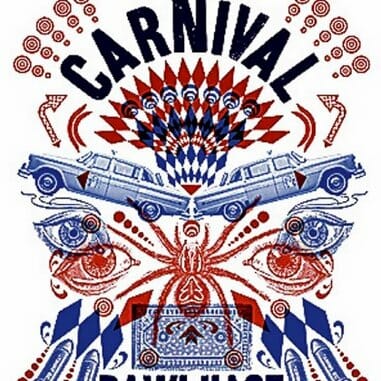
With Carnival, his third novel, Montreal-based author Rawi Hage once again takes facts from his own life, blends them with the carnivalesque (quite literally in this case) and pushes things to the border of the fantastic. For those unfamiliar with Hage, he was born in Lebanon, moved to New York in the 1980s, then veered northward to Montreal where he drove a taxi and wrote.
That trek has paid off.
Hage has won the IMPAC Dublin Literary Award, along with many Canadian prizes, including the Hugh MacLennan Prize for Fiction. His writing earned nominations for the Giller Prize and the Governor General’s Award.
Hage’s writing can be poetic, funny and tragic. Most importantly, it always bears the mark of displacement. It makes sense that expats constitute the true heart and soul of this third novel, placed as society’s central players, the people who make the world go round … or at least make people go around in the world. Hage’s characters in this novel drive cabs. Specifically, he writes about immigrant cab drivers who take on larger-than-life, almost mythical qualities.
The narrator, who calls himself Fly, lays the world out for the reader in extreme and contradicting proportions that feel heartbreaking. Fly, in fact, made me fall in love with books all over again. And why not? A book fanatic raised in a traveling circus, Fly is one strand of a web of cabdrivers in a city that loosely resembles Montreal. He separates cab drivers as “spiders” and “flies.” Spiders wait around for prey to find them. Flies wander and roam the city. By name alone, you know where Fly lands.
At one time or other, each of us has very likely met a Fly—the immigrant prophetic taxi driver with a fascinating, mysterious back story. Hage parts the curtain for us, turning taxi driver into universal narrator. And Fly finds much to narrate. Often socially invisible, the driver serves as a witness bordering on voyeur. Coming from a life in the circus where he guessed people’s weight, he now bridges old and new worlds, as well as fantasy and reality between mythologized past and difficult present.
Hage wants the taxi driver in our constructed present, where circuses are a thing of the past and revolutions a path to misled violence, to stand in for priest, witness and confessor. When Fly’s client brings him into an S&M party, the driver watches as “a chained middle-aged man with a hairy back was stomped on by a topless lady in tight pants and a face mask.” Fly thinks of Dante’s Inferno. This self-mythologized man from the circus walks us through a world where his strange kind died and disappeared, yet where dominatrix and leather-clad men chained like dogs replace trapeze artists and contortionists. The world has lost its magic. Yet without ever being naïve or idealistic, Fly shows it to us through his particular fantastical lens, always finding his inspiration in literature.
In Fly’s universe, books absorb our lives … not the other way around. In fact, people are defined as readers so completely that “reader” is the defining characteristic engraved on a woman’s tombstone after her tragic death. Through all social strife and struggle, being a reader stands as one thing that cannot be taken away and broken.
Fly frequents worlds between worlds without occupying them. He is the ally of prostitutes and transsexuals. As a child of circus performers who was later raised by a bearded lady, he lives easily among those who will become homeless. Fly relates tales of the homesick and culturally displaced, and he might even be an accomplice to the crimes of misfits. He comes from nowhere and lives at the margins of margins.
It might go without saying that Hage sets Carnival during a carnival. The revel lasts an unclear number of days in an unclear place. The unsettled setting blurs as many boundaries as possible. Sacred mixes with profane. Religion and history, twisted in the driver’s wild imagination, become Fly’s masturbation material. Prostitutes go about “working for the cause” and name themselves Mary.
As this suggests, Fly’s skewed universe comes with a heavy dose of cynicism. The narrator challenges the reader to “imagine the fate of any great dynasty without the donkey, the elephant, or the camel’s back.” Even as he aggrandizes himself and the marginal characters he knows, Fly seldom restrains himself from pointing directly at either their misery or their underappreciated and overused status. Taxi drivers uphold the caravan. They allow society to run itself into dizzied oblivion.
In this frantic world, the unnamed, Fly-on-the-wall narrator is a great chameleon. His imagination and knowledge allow him to take on as many identities as he needs. Fly can hide behind literary and historic characters; he can be a madman or a poet, a vigilante, a revolutionary, a circus performer, a sage.
Or he can be a cab driver.
This story of endless layers may panic some readers. But if you are anything like this reviewer, you will find pleasure in pulling off a carnival mask only to find another disguise underneath.
Caitlin Stall-Paquet is a Québécois writer and translator living in Montreal. She writes for a local cultural blog called Midnight Poutine. She has been published in Matrix magazine and on dragnetmag.net and was nominated for the CBC Literary Awards.